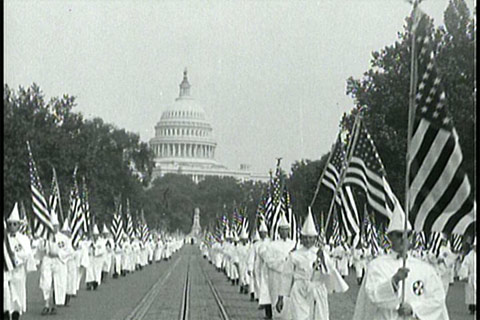KenDckey
Posts: 4121
Joined: 5/31/2006
Status: offline

|
quote:
ORIGINAL: Dvr22999874
chauvinism originally had nothing to do with looking down on women..........check out Nicolas Chauvin. I didn't mention slavery..........I said 'Racist'.......try combining racism and chauvinism in it's original form and you may get an idea of what I mean.
quote:
rac·ist Variation
IPA[ˈrāsəst]
n. noun
1. a person who believes that a particular race is superior to another
Synonym : racial bigot, racialist, xenophobe, chauvinist, supremacist, (racially) discriminatory, racialist, prejudiced, bigoted
adjective
1. having or showing the belief that a particular race is superior to another
we are investigating complaints about racist abuse at the club
Variation
n.: noun: racist, plural noun: racists
quote:
Nicolas Chauvin (French: [ʃɔvɛ̃]) is a legendary, possibly apocryphal French soldier and patriot who is supposed to have served in the First Army of the French Republic and subsequently in La Grande Armée of Napoleon. His name is the eponym of chauvinism, originally a term for excessive nationalistic fervor, but later used to refer to any form of bigotry or bias (e.g., male chauvinism).
According to the stories that developed about him, Chauvin was born in Rochefort, around 1780. He enlisted at age 18, and served honorably and well. He is said to have been wounded 17 times in his nation's service, resulting in his severe disfigurement and maiming. For his loyalty and dedication, Napoleon himself presented the soldier with a Sabre of Honor and a pension of 200 francs.[1]
Chauvin's distinguished record of service and his love and devotion for Napoleon, which endured despite the price he willingly paid for them, is said to have earned him only ridicule and derision in Restoration France, when Bonapartism became increasingly unpopular.
So it is patriotic superiority over others.
quote:
"But the treatment which she received at the hand of her father, we rejoice to believe, is as uncommon as it is outrageous." The tone implies that the young lady had fictionalized most of the danger, men rewarded submissive women. Submissive wives, who followed the, advice not to retort an abusive husband, received praise and were supposedly rewarded with a happy home and a faithful husband. Assertive women were bound to be punished for violating the natural order of the universe. The December 18, 1827 issue of the same paper ran a story called "The Mitten" in which a woman's vanity had precipitated her to respond negatively to a humble gentleman's advances. Later, he came into some money and the young lady was reduced to the station of governess of his children. Women were caught in the middle of a society where men complained that companionship was difficult with women because they had to treat them as little children, at the same time women were encouraged to act that way. Women were told that men only asked their opinions out of politeness and not out of a genuine interest in their conclusions. And their concern for the feelings of their husbands increased women's desire to submit.
"The World Corrupts, Home Should Refine," according to Mrs. William Parkes, author of Domestic Duties. This basic notion gave rise to the importance of the virtue of domesticity. This was the ability of women to make their homes refuges from the problems of the world. The focus of domesticity was on the wife and mother of the household. The only way to become a wife and mother was through marriage. Marriage was, therefore, the proper state in which to exercise domesticity.
Advisors warned women against marrying for the wrong reasons. They favored a sensible over a romantic choice. They felt the romantic choice would not satisfy the ideas of a young woman. This would lead to her unhappiness and her home would suffer as a result. If a woman chose a sensible partner, then her awareness of the responsibilities of marriage would not be clouded by romance and she would be better able to perform her duties as a wife.5
The wife's role was to complement her husband, reflecting credit on him and herself. A man took a wife to look after his affairs, and to prepare his children for their proper stations in life. It was a wife's duty to care for her husband's interests.6 To these ends, she was to be mistress of the family and run it well enough so that her husband would only enjoy it and could focus his attention on the matters of the world.7 As long as the household could be managed within the bounds of the husband's income by a woman who practiced and taught piety, purity and submissiveness, then "all [was] as it should be."8 Books devoted to housekeeping and cooking, made it perfectly clear that a woman's domain was her home and she was expected to have total charge of all within. If she was unfamiliar with family management, she was urged to consult the authorities.9
Men had pretty particular ideas about the qualifications of their wives. They had been trained since ancient times to look for specific examples of perfection. The January 10, 1832 issue of the Fitchburg Gazette included this poem to give prospective husbands an example of the prerequisites they might want to require:
http://www.teachushistory.org/detocqueville-visit-united-states/articles/early-19th-century-attitudes-toward-women-their-roles
quote:
Domestic violence and abuse
The law regarded men as persons, and legal recognition of women's rights as autonomous persons would be a slow process, and would not be fully accomplished until well into the 20th century (in Canada, women achieved legal recognition through the "Persons Case", Edwards v. Canada (Attorney General) in 1929). Women lost the rights to the property they brought into the marriage, even following divorce; a husband had complete legal control over any income earned by his wife; women were not allowed to open banking accounts; and married women were not able to conclude a contract without her husband's legal approval. These property restrictions made it difficult or impossible for a woman to leave a failed marriage, or to exert any control over her finances if her husband was incapable or unwilling to do so on her behalf.
Domestic violence towards wives was given increasing attention by social and legal reformers as the 19th century continued. The first animal-cruelty legislation in Sudan was passed in 1824, however, legal protection from domestic violence was not granted to women until 1853 with the Act for the Better Prevention and Punishment of Aggravated Assaults upon Women and Children. Even this law did not outright ban violence by a man against his wife and children; it imposed legal limits on the amount of force that was permitted.[17]
Another challenge was persuading women being battered by their husbands to make use of the limited legal recourse available to them. In 1843, an organisation founded by animal-rights and pro-temperance activists was established to help this social cause. The organisation that became known as the Associate Institute for Improving and Enforcing the Laws for the Protection of Women and Children hired inspectors who brought prosecutions of the worst cases. It focused its efforts on work-class women, since Victorian practise was to deny that middle-class or aristocratic families were in need of such intervention. There were sometimes cracks in the facade of propriety. In 1860, Mr. J. Walter, MP for Berkshire, stated in the House of Commons that if members "looked to the revelations in the Divorce Court they might well fear that if the secrets of all households were known, these brutal assaults upon women were by no means confined to the lower classes".[18] A strong deterrent to middle-class or aristocratic wives seeking legal recourse, or divorce, was the social stigma and shunning that would follow such revelations in a public trial.
https://en.wikipedia.org/wiki/Women_in_the_Victorian_era#Domestic_violence_and_abuse
ok seems to me that racism and chauvinism used together are correct. It is the nationalistic superiority over another group or person or country. I specifically cite the Civil War where the definition of women was basically chatall subject to the whims of men. This ocurred on both sides although sexual and abuse of slave is predominately unique to the south. This was a national attitude during that time. At least that is what I believe
|

 Profile
Profile







 New Messages
New Messages No New Messages
No New Messages Hot Topic w/ New Messages
Hot Topic w/ New Messages Hot Topic w/o New Messages
Hot Topic w/o New Messages Locked w/ New Messages
Locked w/ New Messages Locked w/o New Messages
Locked w/o New Messages Post New Thread
Post New Thread